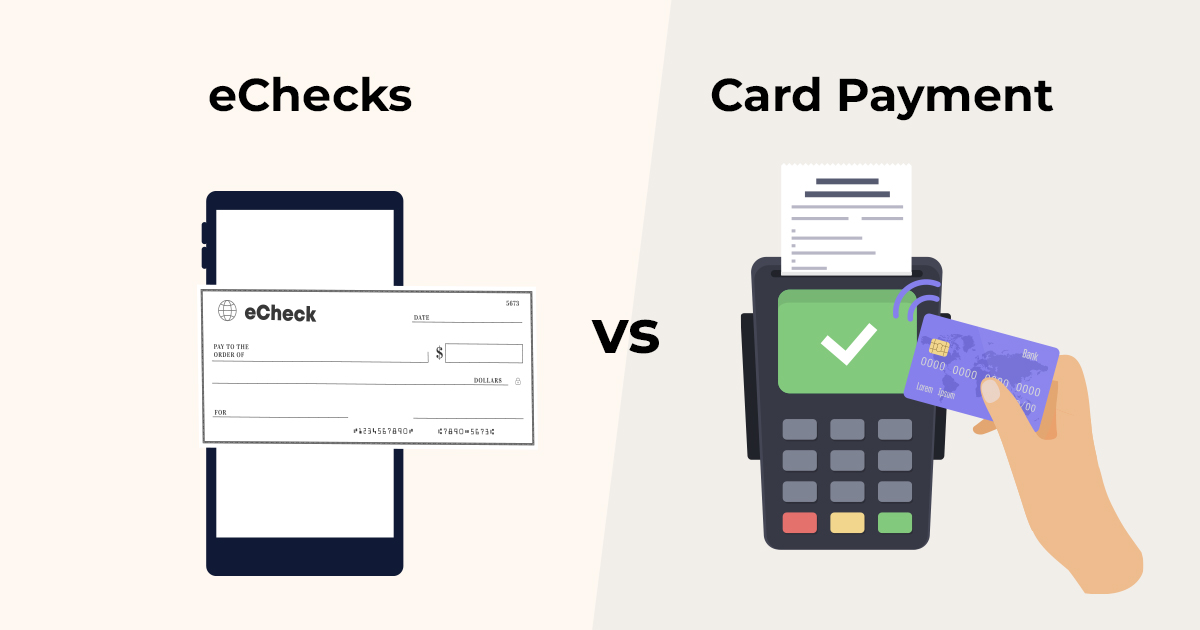
| January 22nd, 2024 |
eChecks vs. Card Payments — Making the Right Choice for Your Business!
In today’s rapidly evolving digital landscape, businesses are presented with a myriad of payment options to facilitate transactions. Two popular methods that often take center stage are electronic checks (eChecks) and card payments. Choosing between these payment methods can significantly impact a business’s financial operations and customer satisfaction. In this comprehensive guide, we’ll delve into the nuances of eChecks and card payments, exploring their advantages, disadvantages, and which option might be the right fit for your business.
What are eChecks?
Electronic checks, or eChecks, are a digital version of the traditional paper checks. This payment method allows businesses and consumers to make transactions by electronically transferring funds from one bank account to another. eChecks leverage the Automated Clearing House – ACH network, providing a secure and efficient way to process payments.
Advantages of eChecks —
- Cost-Effective: eChecks typically incur lower transaction fees compared to credit and debit card payments, making them an attractive option for businesses looking to cut costs.
- Direct Bank-to-Bank Transactions: Since eChecks involve direct transfers between bank accounts, there is no need for intermediaries. This can result in faster settlement times compared to traditional paper checks.
- Recurring Payments: eChecks are well-suited for recurring payments, such as subscriptions or monthly services, providing a convenient option for both businesses and customers.
Drawbacks of eChecks —
- Processing Time: While faster than traditional checks, eChecks may still take longer to process compared to card payments. Settlement times can range from a few days to a week.
- Security Concerns: Though eChecks are generally secure, there is always a risk of fraud or unauthorized transactions. Businesses need robust security measures to safeguard sensitive financial information.
- Global Limitations: eChecks are primarily domestic, and their use for international transactions is limited. Businesses with a global clientele may find card payments more versatile in this regard.
Types of Cards Payments —
Card payments encompass both credit and debit card transactions, providing a convenient and widely accepted method for conducting business transactions.
- Credit Cards: Offer a line of credit to the cardholder, allowing them to make purchases with borrowed money. Payments are typically made on a monthly basis, with interest applied to outstanding balances.
- Debit Cards: Directly linked to the cardholder’s bank account, debit cards facilitate real-time transactions by deducting funds directly from the account. They offer a convenient way to access and manage personal funds.
Advantages of Card Payments —
- Speed and Convenience: Card payments are swift and convenient, offering instant transactions that contribute to a seamless customer experience.
- Global Acceptance: Unlike eChecks, card payments are widely accepted globally, making them a preferred choice for businesses with an international customer base.
- Enhanced Security Features: Credit and debit cards come equipped with advanced security features such as fraud protection, secure chip technology, and two-factor authentication, reducing the risk of unauthorized transactions.
Drawbacks of Card Payments —
- Transaction Fees: Card transactions often incur higher processing fees compared to eChecks. These fees can cut into a business’s profit margins, especially for smaller transactions.
- Chargebacks: Cardholders have the option to dispute transactions, leading to chargebacks. Managing chargebacks can be time-consuming and may result in financial losses for businesses.
- Dependence on Technology: Card payments rely heavily on technology, and any disruptions in payment processing systems or network outages can impact a business’s ability to accept payments.
Choosing the Right Payment Method for Your Business —
1. Consider Your Customer Base:
Understanding your customer base is crucial when deciding between eChecks and card payments. If your customers are predominantly local and prefer traditional banking methods, eChecks might be a suitable choice. On the other hand, businesses catering to a global audience may find card payments more versatile and customer-friendly.
2. Transaction Volume and Size:
The nature of your business transactions plays a pivotal role in determining the ideal payment method. For high-volume, low-value transactions, eChecks may offer cost advantages. Conversely, businesses dealing with larger transactions might find the speed and convenience of card payments more beneficial.
3. Frequency of Transactions:
If your business relies on recurring payments, such as subscription services or memberships, eChecks provide a reliable and cost-effective solution. Card payments, while efficient, may incur higher transaction fees over time.
4. Regulatory Compliance:
Different regions may have varying regulations regarding payment methods. Ensure that your chosen payment method aligns with local and international regulatory requirements to avoid legal complications.
5. Integration with Your Payment Infrastructure:
Consider the compatibility of each payment method with your existing payment infrastructure. Some businesses may find it more seamless to integrate eChecks, while others may benefit from the widespread compatibility of card payment systems.
The Future of Payments —
As technology continues to advance, the landscape of payment methods will inevitably evolve. Businesses must stay attuned to emerging trends and consumer preferences to remain competitive. Striking the right balance between eChecks and card payments may involve offering multiple options to cater to diverse customer needs.
In conclusion, both eChecks and card payments have their merits and drawbacks. The decision ultimately hinges on the unique needs and priorities of your business. By carefully evaluating factors such as transaction volume, customer base, and regulatory compliance, you can make an informed choice that aligns with your financial goals. Whether you opt for the efficiency of card payments or the cost-effectiveness of eChecks, the key lies in understanding your business and its relationship with your customers.